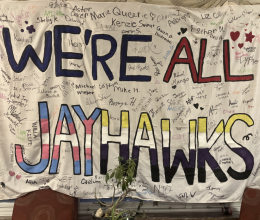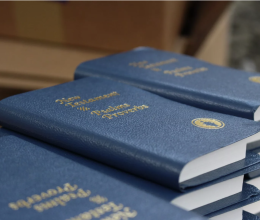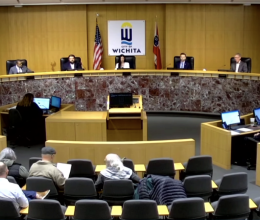On July 3, 2023, the ACLU of Kansas filed an amicus brief in City of Wichita v. Gabrielle Griffie before the Kansas Supreme Court. The brief challenged the constitutionality of the reach and application of the City of Wichita's broad local city ordinance and a corresponding state statute -- both criminalize activity that is protected under the First Amendment.
In the case, Gabrielle Griffie was convicted of unlawful assembly after protesting the murder of George Floyd with her community group, Project Justice ICT, under the Wichita ordinance. Following one of the marches, the City of Wichita charged Ms. Griffie with for "noisy conduct" under Wichita Municipal Ordinance § 5.73.030(1), which criminalized "the meeting or coming together of not less than five persons for the purposes of engaging in conduct constituting [] disorderly conduct" and defined "disorderly conduct as "one of more of the following acts that the person knows or should know will alarm, anger or disturb others or provoke an assault or other breach of the peace: ... engaging in noisy conduct tending to reasonably arouse alarm, anger or resentment in others."
The challenged ordinance failed to meet the constitutional standard that a government must meet in order to regulate speech in public places, lacking any geographic or temporal limitations whatsoever. Rather, the ordinance so far exceeded the bounds of the First Amendment that it would criminalize a plethora of protected activities, including booing or cheering at sporting events, participating in in political protest with sound amplification, arguing with a family member, playing any genre of music, honking a car horn, or even shouting expletives after being stung by a bee. It is crucial to consider that the Wichita ordinance imbued police with the power to selectively enforce it and arrest anyone for speech they disagree with or are angered by, and that in this case especially, Ms. Griffie was criticizing police conduct. Even the mere possibility that police chose to arrest and charge Ms. Griffie based on the content of her speech was sufficient for the Court to strike down the ordinance.
Free speech and expression, especially political protest, are fundamental to our democracy. The ACLU of Kansas urged the Court to reverse the lower court's decisions and find WMO § 5.73.030(1) unconstitutional.
On March 15, 2024, the Supreme Court of Kansas handed down their decision in this case, agreeing with the ACLU's position and reversing Ms. Griffie's conviction.





